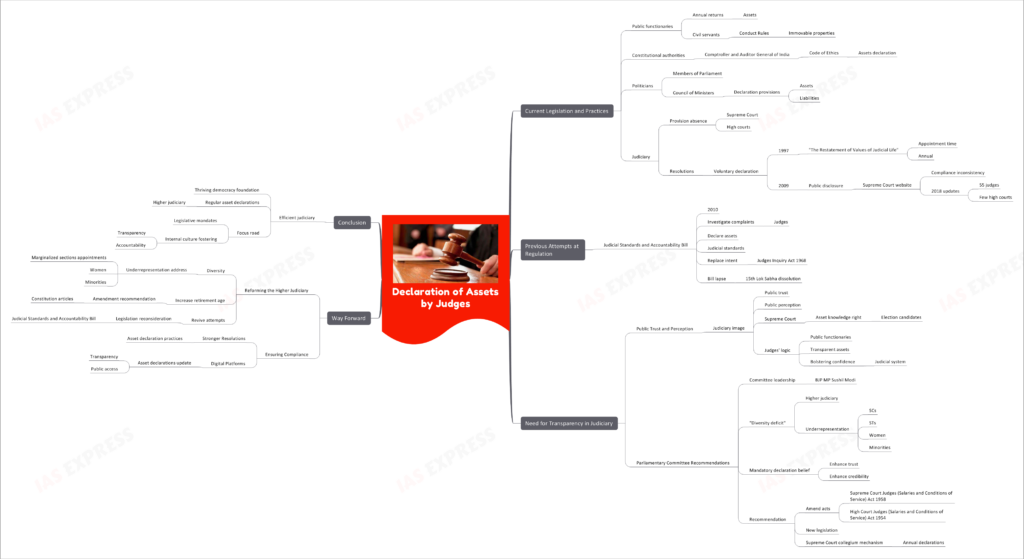Asset Declaration – A Necessity for Judges?
The transparency of the judiciary system and its representatives is a vital aspect of maintaining public trust. The recent recommendation by a parliamentary panel for judges in the higher judiciary to annually furnish their property returns emerges as an important measure in ensuring the credibility of the system.

This topic of “Asset Declaration – A Necessity for Judges?” is important from the perspective of the UPSC IAS Examination, which falls under General Studies Portion.
Background
Current Legislation and Practices
- General practice for public functionaries: Most public functionaries in India must provide annual returns of their assets. Civil servants, for instance, have specific Conduct Rules mandating the annual declaration of immovable properties.
- Constitutional authorities: Authorities like the Comptroller and Auditor General of India upload their assets declaration in line with their Code of Ethics.
- Politicians: Both Members of Parliament and members of the Council of Ministers have provisions guiding the declaration of their assets and liabilities.
- Judiciary: While there’s no specific provision for judges from the Supreme Court and high courts, certain resolutions over the years have urged for voluntary declaration.
- In 1997, the Supreme Court adopted “The Restatement of Values of Judicial Life”, mandating asset declaration at the time of appointment and annually thereafter.
- A 2009 resolution aimed at disclosing assets to the public via the Supreme Court’s website, but compliance is inconsistent. As of 2018, only 55 judges have updated their asset declarations on the website, with few high courts providing any information.
Previous Attempts at Regulation
- Judicial Standards and Accountability Bill (2010): Introduced to investigate complaints against judges, declare assets, and establish judicial standards. Aimed to replace the Judges Inquiry Act 1968, it lapsed with the dissolution of the 15th Lok Sabha and hasn’t been reintroduced.
The Need for Transparency in Judiciary
Public Trust and Perception
- The judiciary’s image hinges on the trust and perception of the public. As the Supreme Court has previously upheld the public’s right to know the assets of election candidates, the same logic applies to judges.
- Judges, being public functionaries, should be transparent about their assets, bolstering public confidence in the judicial system.
Parliamentary Committee Recommendations
- Led by BJP MP Sushil Modi, the committee highlighted a “diversity deficit” in the higher judiciary, underscoring underrepresentation of SCs, STs, women, and minorities.
- The committee believes that a mandatory declaration of assets would enhance the judiciary’s trust and credibility.
- The committee recommends amending the existing Acts (Supreme Court Judges (Salaries and Conditions of Service) Act 1958 and High Court Judges (Salaries and Conditions of Service) Act 1954) or introducing new legislation to mandate the asset declaration. Alternatively, they suggest the Supreme Court collegium could create a mechanism to ensure annual declarations.
Way Forward
Reforming the Higher Judiciary
- Diversity: Address the underrepresentation by ensuring an adequate number of appointments from marginalized sections, including women and minorities.
- Increase retirement age: The committee recommends amendments to relevant articles of the constitution to increase the retirement age for higher judiciary judges.
- Revive previous attempts: Reconsider introducing legislation similar to the Judicial Standards and Accountability Bill to lay down clear guidelines for judicial transparency.
Ensuring Compliance
- Stronger Resolutions: Strengthen resolutions and ensure regular compliance with asset declaration practices.
- Digital Platforms: Regularly update asset declarations on digital platforms for transparency and easy public access.
Conclusion
An efficient and transparent judiciary is fundamental to a thriving democracy. Ensuring that the higher judiciary regularly declares their assets is a pivotal step towards maintaining trust and accountability. The road ahead should focus on both creating clear legislative mandates and fostering an internal culture of transparency and accountability within the judiciary.
Practice Question for Mains
Analyze the impact of mandatory asset declaration by Judges on enhancing the transparency and credibility of the higher judiciary. (250 words)

